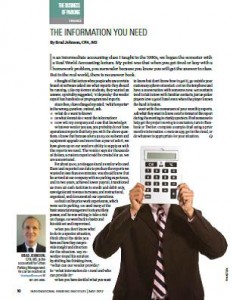In an intermediate accounting class I taught in the 1980s, we began the semester with a Real World Accounting lecture. My point was that when you get tired or lazy with a homework problem, you surrender because you know you will get the answer in class. But in the real world, there is no answer book.
I thought of that lecture when people who use a certain brand of software asked me what reports they should be running. Like my former students, they wanted an answer.
I probably suggested, “It depends;” the vendor says it has hundreds of preprogrammed reports.
Since then, I have changed my mind. “Which reports?” is the wrong question. Instead, ask:
What do I want to know?
In what format do I want the information?
How will my company and I use that knowledge?
Whatever vendor you use, you probably do not have operational reports that help you with the above questions. I know that because after a $200,000 software and equipment upgrade and more than a year of effort, we have given up on our vendor’s ability to supply us with the reports we need. The vendor says for thousands of dollars, a custom report could be created for us. We are unconvinced.
For about $500, a colleague found a vendor who used Excel and exported our data to produce the reports we wanted in less than five minutes. You should know that he arrived at our company with no parking experience, and in two years, achieved lower payroll, transitioned us from all-cash facilities to credit and debit only, saw significant revenue increases, and restructured, organized, and documented our operations.
He built on his prior work experiences, which were not in parking. He used many of the basic financial management tools you likely posses, and he was willing to take a risk on change. He went back to basics and his skill set and improvised.
When you don’t know what to do in a specific situation, think about the skills you have and how they can provide insight and direction for the situation. My co-worker found his solution by shifting his thinking from, “What can our vendor provide,” to “What information do I need and who can provide it?”
When you have decided what you want to know but don’t know how to get it, go outside your customary sphere of contact. Get on the telephone and have a conversation with someone new. Accountants tend to fall in love with familiar contacts, just as poker players love a good hand even when the player knows the hand is beaten.
Meet with the consumers of your monthly reports. Ask what they want to know. Draft a format of the report during the meeting to clarify specifics. Find someone to help get the project moving to conclusion; turn to Facebook or Twitter. Complete a sample draft using a prior month’s information. Create an app, get in the cloud, or do whatever is appropriate for your situation.
Brad Johnson, CPA, MS, is the accountant for Urban Parking Management. He can be reached at bradcpa@cox.net or 401.301.5095.
TPP-2012-05-The Information You Need

